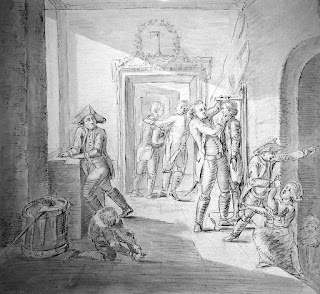Recruitenauslesung in Buttstädter Rathaus (1779)
Indeed, it was in 1779 that Goethe, as a member of Carl August's council, really began to settle into the role of minister. As I mentioned in the last post, by the end of 1778 the demand of Prussia for soldiers led to a fraught political situation for Weimar, which led to Goethe’s appointment as chairman of the War Commission. In that appointment he replaced long-standing minister Jacob Friedrich Freiherr von Fritsch, who appears to have been one of the truly unassailable bureaucrats, which is shown by his appointment to the Secret Council in 1762, when he was only 29 years old. Effi Biedrzynski, in her book Goethes Weimar, has a nice try on von Fritsch, who naturally took it amiss when the youngster Goethe became one of the duke’s ministers and, later, when Goethe superseded him as head of the War Commission.
Goethe’s diary entries for February 1779 are not the short, terse ones of preceding months; which I was able to Tweet. They include somewhat longer ruminations and self-assessment. For instance, the entry for Feb. 1, by which time the Prussian situation had become more serious, mentions “Conseil,” and then “Dumme Luft drinne, fataler Humor von Fr.” So, evidently Fritsch was not in a good mood. Moreover, Goethe writes that the duke talked too much at the session. They later met and Goethe advised him not to talk so much, to moderate his expression, and not to get into a heated discussion concerning matters that should not be addressed. But Goethe also adds some self-assessment, indicating a resolve to make the best of what he calls the “Militarischen Makaronis.” “Die Kr. Comm. werd ich gut versehen weil ich bey dem Geschäfft, gar keine Immagination habe, gar nichts hervorbringen will, nur das was da ist recht kenne, und ordentlich haben will.” Later in the month, sometime after Feb. 14, he writes: “Diese Zeit her hab ich meist gesucht mich in Geschäfften auf recht zu erhalten und bey allen Vorfällen fest zu seyn und ruhig.”Hogarth, English Military Recruitment (1765)
Indeed in February and March Goethe reflects a lot on the work he has to do. Interestingly, there is no mention in the February entries of the letter that was discussed in the last post, which, according to Schöne, must have kept him up half the night composing. At the end of February, we begin to see how busy his official duties keep him. On February 26 and until the middle of March, he traveled from one town to the next — Jena, Dornburg, Apoda, Buttstädt, Allstädt, and Ilmenau — on a recruitment tour (Auslesung der Mannschaft) for the duchy’s soldiery. As Nicholas Boyle writes, this activity took place in “a succession of draughty town halls and unoccupied castles … measuring heights and listening to excuses from the fit and newly married and pleas for admission by the sickly and unemployed.” And in between Goethe dictated the first three acts of the prose version of Iphigenie!
The drawing at the top of the post, made by Goethe during the days on the road, is traced bz Schöne to a scene by Hogarth, which Goethe is likely to have seen, and which, in much more satirical form, shows the recruitment and measurements of soldiers outside an English village inn.
Images: (Goethe-Nationalmuseum Weimar; Kunstsammlung Staats- und Universitätsbibliothek Göttigen




No comments:
Post a Comment